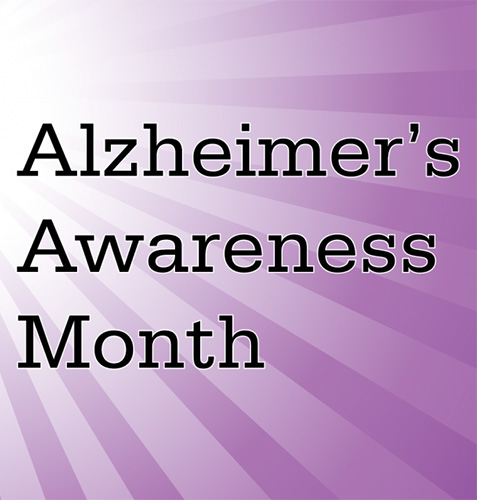November is Alzheimer’s Awareness Month
During the month of November, among the other special occasions, we honor those with Alzheimer’s disease and their valiant caregivers. The challenges of Alzheimer’s and the other dementias cannot be understated. When you add the challenges of aging safely and living well at home, there are some important tips to consider.
With even more holiday celebrations coming up, it is important for families to consider how to best include everyone in activities and festivities. Remembering that someone may become overwhelmed easily by activity, noise, lots of people and the excitement it generates, it is vital to maintain a quiet place or offer a secure refuge. Disorientation and confusion can lead to acting out and fearful behaviors.
Here are a few suggestions as you prepare your home for the season.
- Check the entrance to the house for sturdy handrails by stairs and non-slip treads as the weather changes.
- Make sure the outside lights are working in parking areas, walkways and at the doors.
- Have a designated location for coats and boots to avoid clutter in the foyer area.
- Use plenty of lighting throughout the house but avoid twinkling lights or real flame candles.
- Put away artificial or decorative fruit/vegetables so they are not mistaken for an edible treat.
- Clear bathroom counters of extra items and medications. Soap, towels and a glass for a drink of water will suffice.
- Find tasks for everyone to do if they want to help and participate. Planning ahead will pay big dividends during the course of the family time together.
- Ensure that extension cords do not run across pathways as a possible tripping hazard.
- Check the chairs to confirm that they are steady and placed for easy access.
- Let the visiting family members know in advance if there have been changes so everyone is best prepared to enjoy the holiday time together.
If you are the caregiver, please reach out to others for help with small or large tasks. You are already doing everything and the respite can be rejuvenating. Holidays are stressful in their very nature, so each step, each change, each action can contribute to the creation of special times and memories.
Quick Stats:
- There are over 6 million Americans living with Alzheimer’s Disease with 3 million new cases diagnosed each year.
- Alzheimer’s is deadlier than breast cancer and prostate cancer combined.
- The disease is most prevalent in women and Black Americans.
- 11 million Americans act as unpaid caregivers for a loved one diagnosed with Alzheimer’s.
- Fewer than 1 in 5 Americans are familiar with mild cognitive impairment, which can be an early stage of Alzheimer’s.
Source: Alzheimer’s Association
Alzheimer’s disease is a progressive, deadly brain disease for which there is no cure, and is not a normal part of healthy aging. Researchers are still working to discover the root cause of the disease, but it’s widely believed to be due to the buildup of misfolded proteins between nerve cells, which causes brain damage. This damage begins a decade or more before symptoms start to show. It’s important to monitor yourself and your loved ones for any signs of mild cognitive impairment (MCI), which can proceed Alzheimer’s and other forms of dementia.
Symptoms of Alzheimer’s Disease:
- Memory loss
- Poor judgment leading to bad decisions
- Loss of spontaneity and sense of initiative
- Taking longer to complete normal daily tasks
- Repeating questions
- Trouble handling money and paying bills
- Wandering and getting lost
- Losing things or misplacing them in odd places
- Mood and personality changes
- Increased anxiety and/or aggression
- Difficulty with language
Signs of MCI:
- Losing things often
- Forgetting to go to events or appointments
- Having more trouble coming up with words than other people of the same age
Treatment and Research
Getting checked by your health care provider can help determine if the symptoms you are experiencing are related to Alzheimer’s disease or MCI. Treatment of the disease may involve medications, lifestyle management strategies and enrollment in clinical trials. Johns Hopkins is a leader in geriatrics as well as psychiatry and behavioral sciences as shown through the collaborative effort of the Memory and Alzheimer’s Treatment Center.
Key investigators, Esther Oh, M.D., Ph.D., Constantine Lyketsos, M.D., and Corrine Pettigrew, Ph.D., are available for interviews

